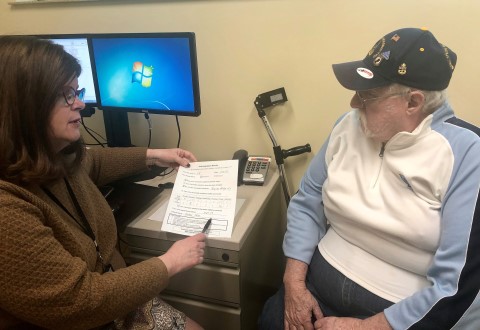VA Mid-Atlantic Health Care Network
In VA, Pharmacists Do more than fill Prescriptions

During a recent visit in the anticoagulation clinic at Charles George VA Medical Center, Pharmacist Angela Pentecost reviews bloodwork of Navy Veteran Michael Parker. VA uses clinical pharmacy specialists or pharmacy providers, embedded in primary and specialty clinics, with appointment slots for veterans. VA approved Doctors of Pharmacy work as clinical pharmacy specialists
“A Coke and a smile,” “Come Alive!” and “Wouldn’t you like to be a Pepper, too?” were slogans for soft drink products, created by pharmacists. That’s right, Coke, Pepsi and Dr. Pepper were created by pharmacists.
Even though we know now that soft drinks aren’t good for everyone, the producers wanted to make people feel good consuming their product and wanted patrons to believe their products were good for them. In fact, Pepsi even suggested, “Pepsi’s Got Your Taste for Life!” But, slogans and soft drinks aside, would you ever really trust a pharmacist to offer comprehensive health care, to actually see patients?
It is happening in VA. Pharmacists (Doctors of Pharmacy with approved scopes of practice) work as clinical pharmacy specialists (CPSs), advanced practice providers serving as core collegial members of the typical Patient-Aligned Care team (PACT). Beyond dispensing medications and warning people about pharmacological side effects, in VA, CPSs are treating patients.
Of course, in the operations pharmacy, where veterans pick up their medications, pharmacists review and verify orders; evaluating for drug-drug interactions, allergies, appropriateness of dosage and duration, etc. They also provide patient education and counseling.
But then, VA uses clinical pharmacy specialists or pharmacy providers, embedded in primary and specialty clinics, with appointment slots for veterans. In a PACT the Primary Care Provider (PCP) determines if the veteran would benefit from a pharmacist provider follow-up, instead. This type of appointment can increase access to PCPs.
“I absolutely love the opportunity to support our staff and improve the health of our veterans as they work to manage chronic diseases,” chimed pharmacist Angela Porter, currently Associate Chief for Pharmacy and Clinical Services at Charles George VA Medical Center in Asheville, N.C.
She can do that because she has been trained, as other modern-day doctoral pharmacists in a curriculum (about 4 years undergraduate + 4 years doctorate + 1–2 years residency + a possible 1–3 years fellowship = 8–13 years of academic and practical training, before testing for licensure) that has prepared her to engage patients and offer advanced-level-care. All pharmacists are now required to complete their education at the doctoral level, although not everyone is allowed by their employers to exercise the advanced level of practice.
VA encourages further training, with an additional year of post graduate (PGY-1) clinical training after graduation and licensure. Less than five percent of VA’s CPS are estimated to lack the enhanced training. Some have completed a second year (PGY-2) clinical training in a more focused sub-specialty (cardiology, mental health, infectious disease, oncology, etc).
According to VISN 6 Chief of Pharmacy Steve Coombs, [VA] is very progressive in its use of clinical pharmacist specialists (CPS). He says that CPSs perform their drug management functions via what is known as a scope of practice, defined by the Chief of Pharmacy and approved by the medical staff.
Completing the scope process at their medical center, they are credentialed and presented to the facility professional standards board (Generally comprised of physicians). Once the CPS has a scope of practice, which includes the ability to order labs, imaging and initiate/change/ discontinued medications as appropriate they undergo a scope renewal every two years and a clinical care review every six months. Porter maintains the staff and Veterans at Asheville have solid confidence in CPS performance.
To help drive the point home, Porter emphasized, “who better for chronic medication management, than a pharmacist with specialized focus in clinical care?”
On a recent morning that Navy Veteran Michael Parker saw Pharmacist Angela Pentecost in the Charles George VAMC anticoagulation clinic, he declared, “My pharmacist is awful nice. She treats me well.”
Having pharmacists join with nurse practitioners and physician assistants means more qualified individuals can work with patients whose conditions are less critical. It defrays the cost of health care by enabling medical doctors to concentrate on cases for which they are uniquely qualified.
So, with prudence VA can staff more clinics and will find itself with less provider shortages. Porter adds, “They improve the overall health of our veterans with management of chronic disease states (asthma, COPD, diabetes, gout, hypertension, thyroid disease, HF, vitamin deficiencies, etc) and medication monitoring. They can prescribe and titrate medications as needed and as appropriate, autonomously order medications, lab tests, consults and perform physical assessment.”
Consultation with a primary care or specialty provider is conducted for advanced patient care management if outside of the pharmacists’ scope when the patient is acute, requires diagnosis or is deteriorating.
Coombs stressed, “Team collaboration is paramount for positive outcomes for our Veterans, and we have wonderful teams to work with, who truly put the veterans first.” Navy Veteran Parker summed up his care, saying, “I am very thankful for the VA. I would not have any health care if it wasn’t for the VA. The nurses and docs are top-notch.”
















